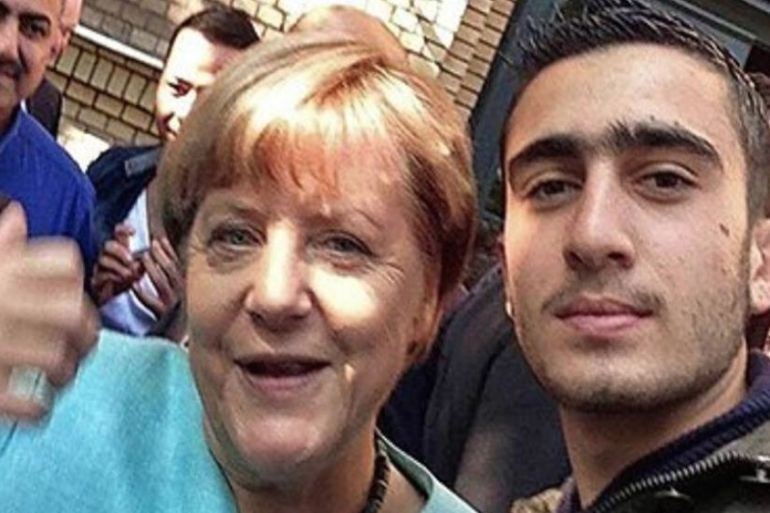Syrian refugee’s ‘voice was not heard’ in Facebook case
German court has rejected Anas Modamani’s request for Facebook to seek out and remove posts linking him to ‘terrorism’.

The verdict came as a blow to Syrian refugee Anas Modamani.
This week, a German court rejected the 19-year-old’s case against Facebook, in which Modamani sought to have the social media giant delete a series of fake news posts linking him to “terrorism”, and to take action to prevent future posts.
Keep reading
list of 4 itemsBeyond borders: Migrants online
Tunis police raid sees refugees abandoned near the border with Algeria
‘No turning back’: Carnation Revolution divides Portugal again, 50 years on
“My voice was not heard,” Modamani told Al Jazeera. “I’m saddened by the outcome.”
The case began to unfold in September 2015, a few months after Modamani arrived in Germany as a refugee. He snapped a selfie with Chancellor Angela Merkel at his shelter in Berlin, but soon afterwards, he became the target of racist trolls online.
His photo began appearing in posts on social media falsely linking him to attacks in Brussels and Berlin, and wrongfully claiming that he tried to set a homeless man on fire.
READ MORE: How a selfie with Merkel changed Syrian refugee’s life
In the high-profile ruling, the German court concluded that “Facebook is neither perpetrator nor participant in the indisputable slander”, noting that Facebook as “a host provider is only responsible for third-party content” after being notified of it. The judge ruled that the social network was not obliged to actively seek out and delete defamatory posts.
“Shouldn’t it be possible to delete the photo everywhere and stop it from being used again?” Modamani asked wearily.
“I want these posts to stop,” he said. “I fled the war in Syria to live in peace, but then people started calling me a terrorist. It is hurtful and it makes me angry that people are telling lies about me.”
The past three months have been an emotional rollercoaster, Modamani added.
“I had never set foot in a court before, and it was difficult to follow the proceedings in German,” he said, noting that in addition to a worldwide outpouring of support, he has also received hateful messages, including one social media user who told him: “Go back to your own country.”
|
|
The photo has become a symbol of Merkel’s open-door refugee policy. In 2015, Modamani, who grew up in the Damascus suburb of Darayya, was one of 890,000 asylum seekers who came to Germany.
After Tuesday’s ruling, Modamani’s lawyer, Chan-jo Jun, noted: “Whether it is actually technically and economically possible for Facebook to develop a ‘miracle machine’ to track down infringing content – if it does not already exist – can only be determined in [separate] proceedings, according to the court … We therefore see [Tuesday’s] decision not only as a defeat, but also as an opportunity.”
Jun, who has since ceased to represent Modamani after receiving anonymous death threats during the trial, did not comment on whether there would be an appeal.

Facebook has said that it understands the situation is “very difficult” for Modamani, noting that it quickly removed any defamatory posts reported by Jun. It has vowed to continue to do so in the future.
In Germany, Facebook works with the non-profit Correctiv as an external fact-checker to identify fake news, and it has implemented tools for users to flag illicit posts.
In addition, the German site Hoaxmap.org monitors and debunks false posts. “We’ve witnessed an increase of fake posts on social media since summer 2015,” Hoaxmap developer Karolin Schwarz told Al Jazeera. “This coincided with Angela Merkel’s decision to take in refugees who had been stranded along the Balkan route. Asylum seekers are the main target. It’s easy to blame marginalised people for problems. This has been the case long before the internet was invented.”
In January, a Breitbart story falsely claimed that an “angry mob of 1,000 men chanted ‘Allahu Akhbar’, launched fireworks at police and set fire to a historic church” in Germany. Other hoaxes have included claims that refugees were being put on social benefits for life.
The German government is currently considering legislation to fine social networks up to €500,000 ($527,000) for illicit content that is not removed within 24 hours of being flagged up.
INTERACTIVE: Life on hold – The struggle of Syrian refugees
Meanwhile, Modamani’s new life in Germany has been overshadowed by fear since fake clickbait linking him to “terrorism” started spreading.
“I don’t want to have to worry about where my photo might appear,” he said.
Now living with a foster family in Berlin and working at a McDonald’s restaurant, Modamani has been taking German language classes and making friends in his host country.
“[But] it’s a different culture, and integrating has been a challenge,” he said. “I’m also constantly worried about my family. I want to study and find a good job to be able to bring them to Germany.
“I love Facebook. I found a home through it and I use it to keep in touch with friends,” Modamani added. “But it also changed my life.”